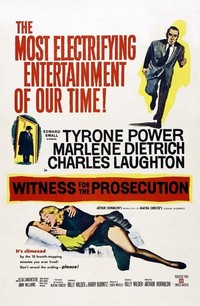
Witness for the Prosecution (1957)

Raiting: ![]() 8,4 /10
8,4 /10
Genre: Crime
Director: Billy Wilder
Stars: Tyrone Power, Marlene Dietrich and Charles Laughton
Country: United States
Release date: 17 December 1957
Length: 116 minutes


Raiting: ![]() 8,4 /10
8,4 /10
Genre: Crime
Director: Billy Wilder
Stars: Tyrone Power, Marlene Dietrich and Charles Laughton
Country: United States
Release date: 17 December 1957
Length: 116 minutes